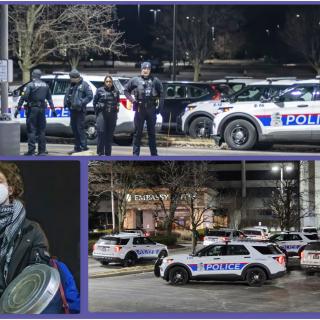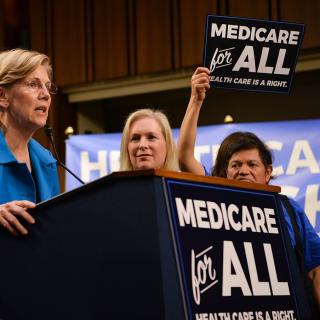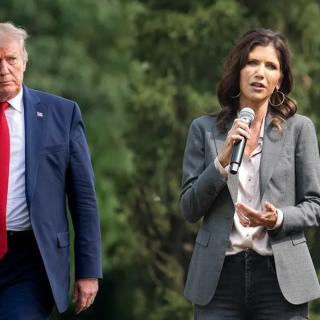Advertisement
Unknown to many residents of Columbus is the curious one-sided relationship between a small revenue-generating, non-academic element of the prestigious Harvard Business School, and certain elements of Columbus’ aspirational self-appointed, private “leadership class.”
Columbus CEO reminds us of this revealing connection in its announcement “Harvard Business School calls on Columbus execs for leadership program.” (Jess Deyo, May 24, 2022) Note the curious phrasing “calls on.”
Calls on Columbus execs to do what? Certainly not contribute to addressing the general lawlessness or solving the heart-breaking calamity of Columbus’ record-surpassing homicides in 2020 (175) and even more in 2021 (204); its lack of affordable housing; food and health deserts; failing infrastructure; and lack of city planning.
In typical Columbus Way hyperbole, Columbus CEO exaggerates, “Every year since 2015, Harvard Business School professor Jan Rivkin has put dozens of America’s changemakers in one room and asked them the same question: Is Columbus a successful city?” Neither the numbers nor the definition of “changemaker” is defined.
All these changemakers must be anti-democratic Columbus Way self-promoters in training, cramming into Rivkin’s classroom to discuss one question without ever defining “successful” or “city.”
Their city booster coach, the non-scholarly professor Rivkin opines unhelpfully but in the Columbus Way, “the answers are all over the place. Some point to great outcomes, some point to poor outcomes, some point to great processes, some point to poor processes in the community.” No one asks “what”, “when”, “how”, how much”, or what are the questions? That is how Rivkin found a ready customer for his rhetorical wares.
Rivkin sold his services, with a never-announced-price, to the Columbus Partnership beginning in 2015 before he and colleagues launched two broader-based rhetorical city promotion sales courses: Young American Leaders Program and U.S. Competitiveness Projects. Both of these, let it be clear, are money-making marketing campaigns not data-driven primary source research-based efforts. We cannot find information about YALP on the Harvard Business School website itself, but a search yields many pages from cities around the country boasting about sending their “young leaders” to Harvard.
The Rivkin-HBS-Columbus association began with an amorphous, self-appointed faux-public private interest Columbus Partnership headed by Alex Fischer, their long-standing, but now former President and CEO. The ambiguously-named Columbus Partnership (with whom do they partner specifically?) commissioned Rivkin and his HBS-based program, at least partially underwriting Rivkin’s “case study” on “The Columbus Partnership.” These HBS “case studies” make no pretense of original scholarly research; they are case studies in self-promotion with no regard to truthfulness or accuracy.
The case study’s fine print states, “it was reviewed and approved before publication [by HBS itself] by an organization designate. The Columbus Partnership funded transportation for an initial visit. . . . HBS cases are developed solely on the basis for class discussion. Cases are not intended to serve as endorsements, sources of primary data, or illustrations of effective or ineffective management.” What the cases are and do is obscure and obscured. Regardless, HBS’ Columbus Partnership was shared widely local and nationally. That is the HBS and the Columbus Way, a meeting of self-interests.
The case study reads as if the Partnership’s ad agency drafted it with heavy dependence on sources like Wikipedia. Thus, it is inaccurate historically and recently. The three years from 2012 to 2015 garner the most column inches. That’s the only way that the undocumented contribution of the Columbus Partnership can be asserted. Scattered anecdotes from an undefined sample of “city” and/or “business leaders” cannot bear the weight assigned to them, to prove, for example, that “City leaders considered Columbus far from typical…in the manner that citizens (read instead: corporate business interests) worked together” and that those who moved to Columbus “said they were more collaborative and civically engaged…than they had been in their prior homes.” Neither ages nor positions are noted.
Without any serious effort to attribute responsibility or actual contributions, the “leaders” are somehow the agents for “downtown revitalization,” Columbus State Community College, “Big Data and cybersecurity.”
Most of all, as the myth-making through Rivkin and his HBS offices, the Columbus Partnership emerges out of the pockets and mouth-pieces of Limited Brands founder Les Wexner and the Columbus Dispatch’s long-term owner and major developer John F. Wolfe. With the aid of paid agents like Rivkin, the never-defined or documented Columbus Way emerged as myth, ideology, and thin veneer of civic identity. (See Cox, Boomtown Columbus; Eckhart, “Anti-Democratic;” Graff, “Columbus searches for its Downtown;” “Columbus, Ohio, searches to be a city;” 9, 2022; “Is Columbus really a city?”)
With no effort to show a relationship, let alone a causal one, the HBS case study presumes to link these “changemakers” and their “partnership” to 21st century Columbus. Thus, “The Columbus Partnership made use of the city’s collegiality to pursue a range of undefined and undocumented activities”: “benchmarking;” “economic development”; “community branding.” The extent of repetitious vagueness pits empty self-promotion with self-incrimination.
How does the Columbus magic operate: “freshman orientation”; “opportunistic issues”; “leadership retreats.” It is no surprise that the Partnership’s partnership with Rivkin’s corner of HBS quickly led from his superintending the occasional retreats to his holding kindergarten summer sessions to “call on [junior] Columbus execs….”
Given the economic partnership between Rivkin/HBS and Alex Fischer, it is no surprise that Rivkin ascribes to Fischer a greater contribution to his Young American Leaders Program than either he or anyone else claims for Fischer at home. Yet Rivkin does not accord the Columbus Partnership and its newer partner the Columbus Foundation any greater weight in his now fourteen-city program than any others. The promotional “program” grew from “cities where we felt we knew some critical individuals.” The program occupies all of four days each June. With a mix of attendees representing private and public, for-profit and not-for profit organziations, the current head of the Columbus Foundation Doug Kridler proclaims “Such a program is vital to Columbus’ growing economy and population.” But he makes no attempt to say or show how and why. He cannot. That is the Columbus Way: proclaim it and it will be true.
The results pollute the air of the city but not its streets or the welfare of its people. Following his mentor, former mayor Michael Coleman, who now exerts more influence as Chair of the Board of Directors of the Columbus Downtown Development Corporation (and commands an astronomically higher salary as the Partner-in-Charge of Government Law at the firm lce Miller) than he did as mayor, incumbent Andrew Ginther proclaims that Columbus is “America’s Opportunity City” in CITYPULSE: Your Guide to Columbus. The official mayor’s office website asserts that “Under the leadership of Andrew J. Ginther, the City of Columbus was named America’s Opportunity City.” What opportunity and for whom is never addressed?
But it is Ginther who “named” the city! No one else. In the same breath, he states that the 220 year old city is “a young city.” This is the Columbus Way.
In the unrefereed “public sector innovation” site, GOVERNING The future of the States and Localities (e.Republic. Smart Media for Public Sector Innovation, Feb. 18, 2022), one Aaron M. Renn published an undocumented opinion essay, unoriginally entitled “America Discovers Columbus.” He begins, “Ohio’s largest city has never attracted much national attention, but that is beginning to change.” Renn proceeds from one falsehood to another, seemingly unaware. In three pages, there are more contradictions—competing with hyperbole--than I can count. Neither facts nor chronology matter. The rousing conclusion to this article is, not unsurprisingly, unadulterated ambiguity: “What the X-factor for Columbus will be to get it to the next level is unclear.”
I end by completing the circle. The Columbus Partnership’s website’s homepage long declares, “The Columbus Partnership is committed to the Columbus Way. It’s the practice of community stewardship, anchored by a set of values and principles that power progress in our region.” It is tautology triumphant. That is the Columbus Way.
This is on display throughout the unclean, unsafe, unhealthy, deeply unequal, and deadly murderous city.
Note: on the continuing theme of Columbus’ lack of identity and historical ignorance: according to Columbus Business First, June 2, 2022, Columbus developer Rockbridge’s “forthcoming” hotel on the Scioto Peninsula will be called “The Junto Hotel.” They attribute that name to Benjamin Franklin’s Philadelphia political club, which was also called “Leather Apron Club.” Asserting that Franklin aimed at “mutual improvement,” they do not know that junto is “a political grouping or faction, especially in 17th- and 18th-century Britain” and “a self-appointed committee, especially with political aims; cabal.” It is associated with both left and right wing activism including “a group of military officers holding the power in a country, especially after a coup d'état.” This is the Columbus Way.
So too is naming the hotel’s coffee shop Maudine’s for “the cow that was crowned Ohio’s homecoming queen in the 1920s.” It will feature “alternative milks.”
References
Kevin Cox, Boomtown Columbus: Ohio’s Sunbelt City and How Developers Got Their Way.
Columbus: Ohio State University Press, 2021
Jess Deyo, “Harvard Business School calls on Columbus execs for leadership program,” Columbus CEO, May 24, 2022
Bob Eckhart, “The Anti-Democratic Nature of the Columbus Way,” Columbus Free Press, Mar. 10, 2022
Andrew J. Ginther, “America’s Opportunity City,” Advert, CITYPULSE: Your Guide to Columbus, 2022
Harvey J. Graff, “Columbus’ identity crisis and its media,” ColumbusUnderground ,July 23, 2021
“Columbus City Government is Undemocratic and Disorganized: It’s 2021 and we need a revolution in this city,” Busting Myths, Columbus Free Press, Nov. 20, 2021
“Columbus searches for its Downtown with historical, urbanist, and developers’ blinders,” Busting Myths , Columbus Free Press, Dec. 22, 2021
“Columbus, Ohio, searches to be a city: The myth of the Columbus Way,” Busting Myths, Columbus Free Press, Jan. 9, 2022
“Is there a City of Columbus?” Busting Myths, Columbus Free Press, Apr.7, 2022
“Columbus isn’t Cowtown or Silicon Valley Heartland; I’s the lawless wild-wild-Midwest,” Busting Myths, Columbus Free Press, April 20, 2022
Aaron M. Renn, “America Discovers Columbus,” GOV: Governing the Future of States and Localities, e.Republic, Feb. 18, 2022
Jan W. Rivkin, “The Columbus Partnership,” Harvard Business School, 9-715-462, May 1, 2015
Columbus Partnership https://columbuspartnership.com/columbusway
---------------------------------
Harvey J. Graff is Professor Emeritus of English and History at The Ohio State University and inaugural Ohio Eminent Scholar in Literacy Studies. Author of many books on social history, the history of literacy and education, and interdisciplinarity, he writes about the history and contemporary condition of higher education for Times Higher Education, Inside Higher Education, Academe Blog, Washington Monthly, Publishers Weekly, Against the Current; Columbus Free Press, and newspapers. Searching for Literacy: The Social and Intellectual Origins of Literacy Studies is published by Palgrave Macmillan this summer.
Bob Eckhart is a former faculty member at OSU. In twenty-plus years at Ohio State, he taught in the colleges of Law, Business, Arts & Sciences, and Education & Human Ecology. He was Founding Director of the Wuhan University-Ohio State University Center for American Culture, funded by the U.S. Department of State. In 2018, he received a Fulbright Scholar grant to Minsk Belarus, and was recently awarded another Fulbright Scholar grant to Moldova. He has taught in and/or managed academic programs in China, Indonesia, Turkey, France, Moldova, Ukraine, Morocco, and Nigeria. He is co-author of Maurice Clarett’s memoir, One and Done: How My Life Started When My Football Career Ended.



